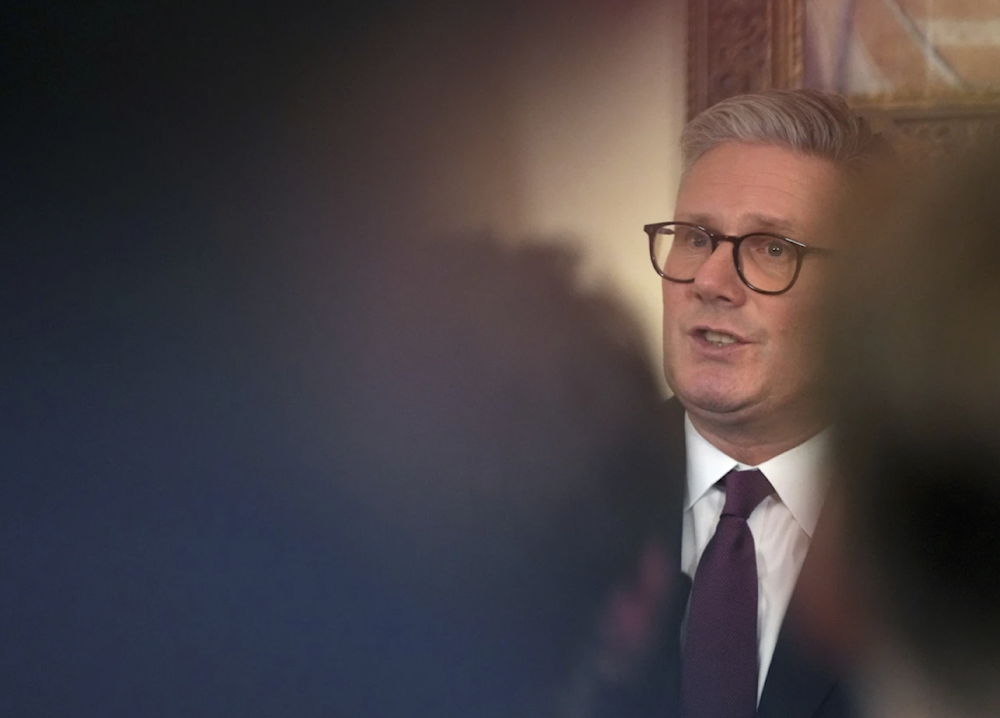UK's Starmer, Germany’s Merz eye boosting defense spending
The UK and Germany have both made plans to increase their defense spending in an attempt to maintain a united front in the face of Donald Trump.
-

Britain's Prime Minister Keir Starmer speaks to guests as he holds a reception on the third anniversary of the war in Ukraine in London on February 24, 2025. (AP)
UK Prime Minister Keir Starmer revealed Tuesday that he plans to increase yearly defense expenditure to 2.5% of GDP by 2027, with an aim of 3%, the highest level since the Cold War, as a statement to US President Donald Trump that Britain can strengthen Europe's security.
On the day of his departure to meet with Trump in Washington, Starmer said he was pushing the boost in defense expenditure forward to give Europe greater support while the US leads peace negotiations with Russia over the war in Ukraine.
With public expenditure already stretched in Britain, Starmer said the hike from 2.3% would be entirely paid for by a 40% decrease in international aid, a statement he said he was not delighted to make but was necessary to provide Ukraine and Europe support in a "new era".
Since Trump took a harsher stance on Ukraine, Starmer and other European leaders have increased efforts to put up a united front for Kiev.
Starmer vowed the government would begin the "biggest sustained increase in defense spending since the end of the Cold War," adding that when coupled with spending on intelligence services, it will reach 2.6% by 2027. He emphasized that all European allies "must step up and do more for our own defense," detailing how Britain will establish a target of 3% of GDP for the next parliament, which will assemble following a general election in 2029.
After chatting with British Defense Minister John Healey, US Defense Secretary Pete Hegseth applauded the increase in funding calling it a "strong step".
According to Starmer, the rise would result in Britain spending 13.4 billion pounds ($17 billion) more on defense each year beginning in 2027.
The Institute for Fiscal Studies, a nonpartisan think tank, called this amount "misleadingly large" because an increase of 0.2 percentage points in GDP amounted to just roughly 6 billion pounds.
Britain last lowered its assistance budget in November 2020, amid an economic crisis caused by COVID, cutting it to 0.5% of GDP from 0.7%, a move lambasted by several development groups for decreasing the country's worldwide influence.
Starmer's comments ahead of his visit to Trump signal Britain's intent to lead NATO countries in increasing defense funding, aligning with Trump's 5% GDP demand, while also aiming to assure Europe’s commitment to supporting Ukraine if peace talks with Russia succeed.
Starmer also wants a "backstop" from the US for any security assurance from Europe, which, he argues, "will be vital to deter Russia from launching another invasion in just a few years' time".
"The U.S. is our most important bilateral alliance," he divulged, adding that when he visits Trump, he will make it clear he wishes the "relationship to go from strength to strength."
French President Macron and Trump agreed to send European peacekeepers, with Macron clarifying that European aid to Ukraine was not just loans but "real money, to be clear."
Starmer hopes that by pledging to raise defense spending, he would be able to extract a guarantee from Washington to provide a backup for European states.
Germany discusses allocating €200 billion for emergency defense fund
German Chancellor-elect Friedrich Merz has started talks with Social Democrats to quickly approve up to €200 billion ($210 billion) in special defense spending, according to a familiar source.
Sources said officials from Merz's Christian Democratic Union and the Social Democratic Party are discussing ways to overcome Germany's strict borrowing limits to free up resources for the country's struggling military.
They added that they are considering pushing for a vote on the new package, which would be double the size of the one approved three years ago, through parliament.
One idea being discussed in Germany is the approval of a special fund for new military spending and aid to Ukraine. Other options include expanding the existing €100 billion fund or modifying the so-called debt brake to allow additional defense spending. Any of these options would require a supermajority of two-thirds of lawmakers, and securing this majority will become more difficult once the next legislative body convenes.

 4 Min Read
4 Min Read










